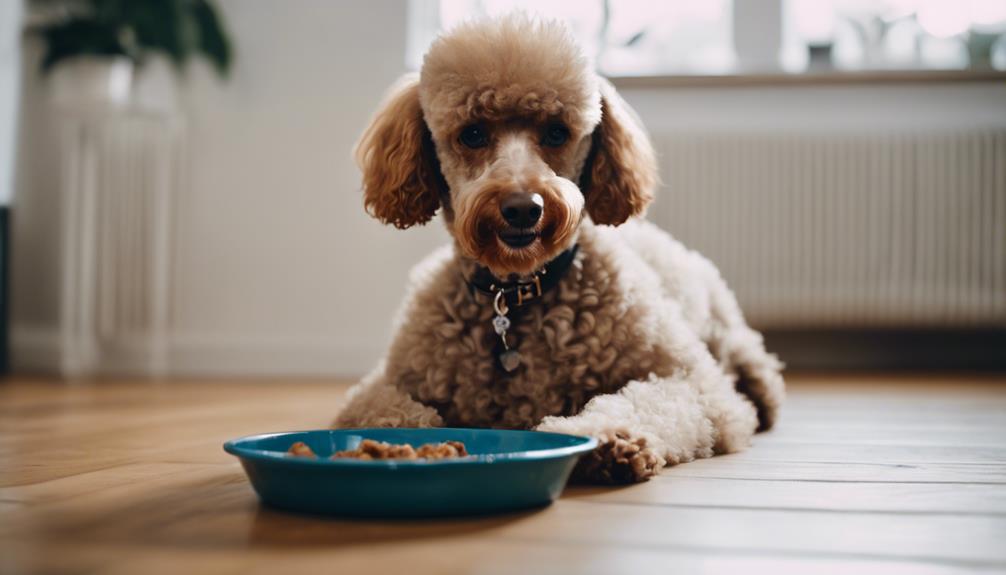When tackling food aggression in Poodles, pinpointing potential triggers and practicing patience are paramount. However, the journey to addressing this behavior goes beyond just understanding the causes; it delves into the realm of behavioral modification and consistent practice. So, how can you effectively navigate these waters and ensure your Poodle's mealtime manners are top-notch? Let's explore the tactics and strategies that can transform mealtime into a peaceful and positive experience for both you and your four-legged companion.
Key Takeaways
- Recognize food aggression signs like growling and snapping
- Establish pack leadership through consistent training
- Implement consistent feeding practices to manage aggression
- Use techniques like hand-feeding and desensitization for effective handling
Understanding Food Aggression in Poodles
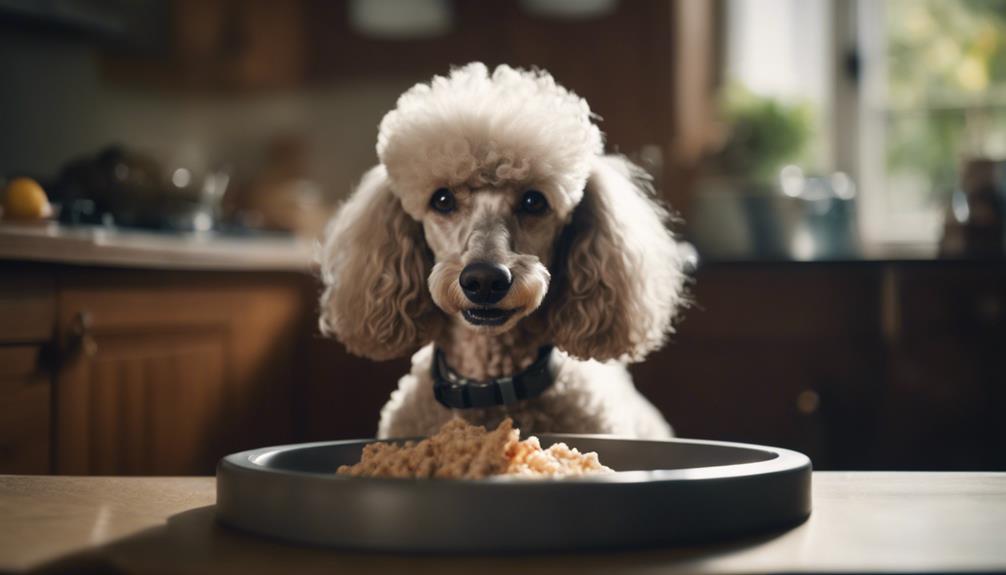
When addressing food aggression in Poodles, it is essential to understand the underlying reasons for this behavior. Poodles may exhibit food aggression due to their guarding instincts, which stem from their hunting background. These instincts can cause mild signs like growling or more severe behaviors such as biting or chasing away perceived threats when it comes to food. It is crucial to recognize that a Poodle's food aggression can be directed towards humans, animals, or both, depending on their individual behavior and past experiences.
Handling aggression in Poodles requires patience and a deep understanding of their nature and confidence levels. By acknowledging their guarding instincts, you can approach their food aggression with empathy and practical strategies. Professional help is recommended for severe cases to ensure proper training and behavior modification tailored to your Poodle's specific needs. Remember, addressing food aggression in Poodles is about creating a safe and harmonious environment for both your pet and those around them.
Identifying Signs of Food Aggression
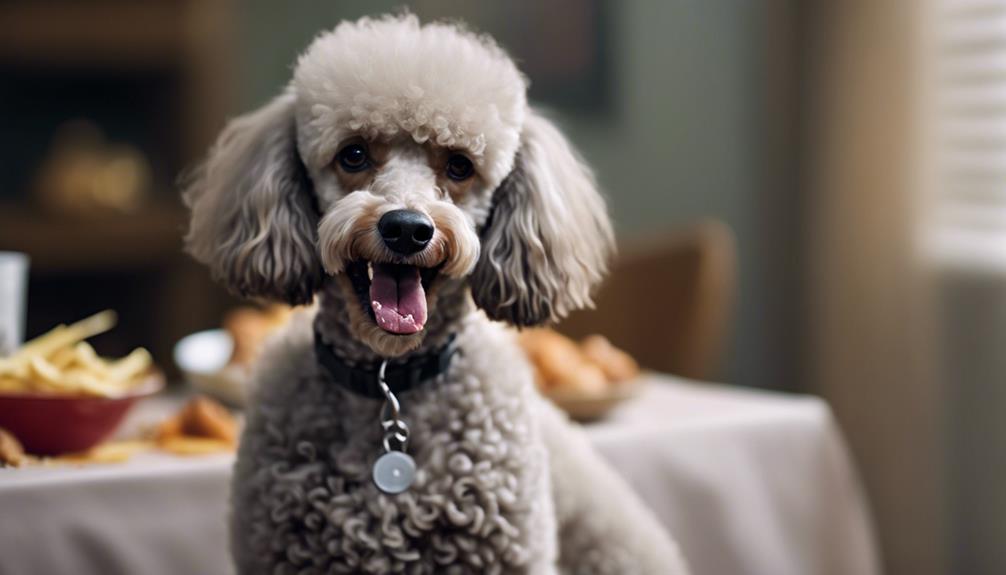
Identifying signs of food aggression in your Poodle is crucial for understanding and addressing their behavior effectively. Poodles may exhibit food aggression through growling, snapping, or showing teeth during meals. Watch out for signs like stiffening, raised hackles, and guarding their food bowl. Sometimes, Poodles may display subtle cues such as freezing, staring, or quickening their eating pace when feeling threatened. Keep an eye on their body language too; ears back, lowered tail, and avoidance can all signal food aggression in Poodles.
It's essential to recognize and address these early signs of food aggression in your Poodle to intervene effectively and provide appropriate training. By understanding these signs and behaviors, you can create a safer and more harmonious mealtime environment for both you and your furry friend. Remember, patience and consistency are key when dealing with food aggression in Poodles. If you notice any of these signs, take proactive steps to address the issue promptly and seek professional guidance if needed. Your Poodle will thank you for creating a positive and stress-free mealtime experience.
Establishing Pack Leadership
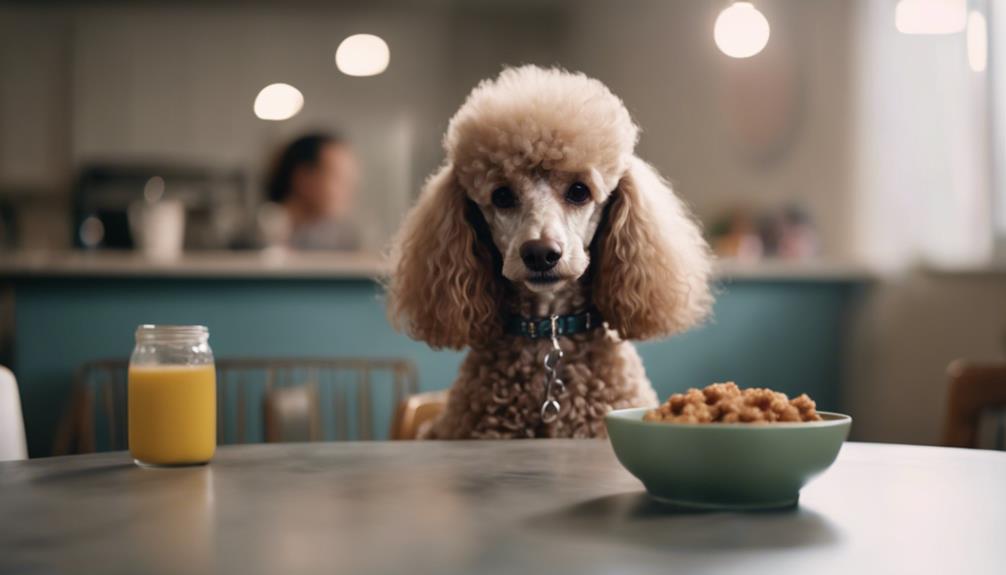
Establishing pack leadership with your Poodle requires consistent implementation of rules and boundaries to foster trust and respect within your canine companion. By taking on the role of the leader in your Poodle's eyes, you can effectively address issues like food aggression and resource guarding. Here are some key points to help you establish pack leadership:
- Consistent Training: Regular training sessions help reinforce your leadership role and establish clear communication with your Poodle.
- Setting Boundaries: Clearly define boundaries and expectations to guide your Poodle's behavior and prevent any signs of food aggression.
- Positive Reinforcement: Use positive reinforcement techniques to reward good behavior, strengthening the bond between you and your Poodle while encouraging respect for your leadership.
Implementing Consistent Feeding Practices
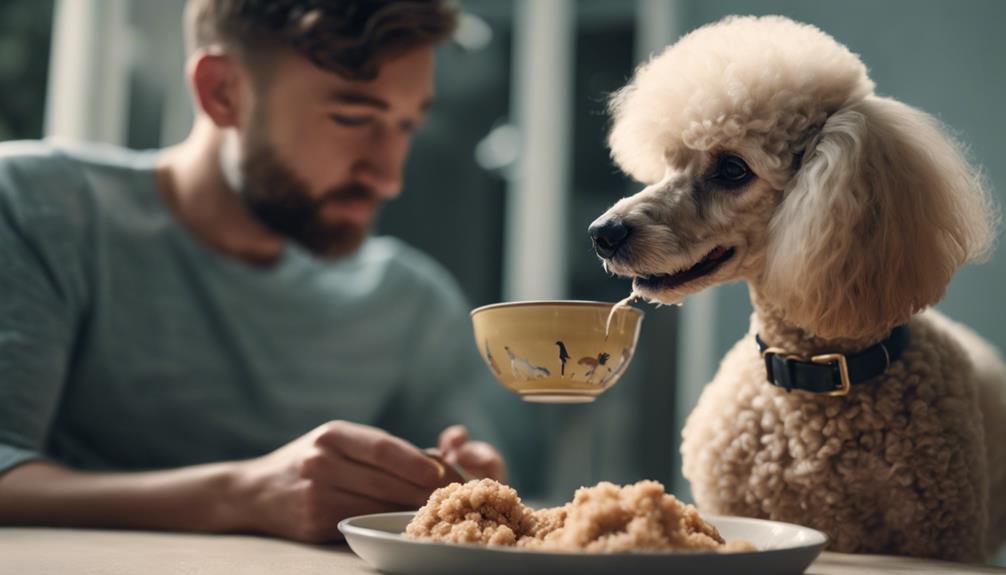
To ensure a harmonious mealtime experience and address food aggression effectively in your Poodle, consistency in feeding practices is key. Implementing controlled feeding practices can help manage food aggression in dogs. By establishing a routine with set feeding times, you can reduce anxiety in your Poodle and create a predictable environment that promotes calm behavior during meals. Additionally, using separate feeding areas or bowls for each Poodle in a multi-Poodle household can prevent conflicts and reduce the likelihood of food aggression. To emphasize the importance of consistency in feeding practices, consider the following table:
| Consistent Feeding Practices |
|---|
| Establishing routine feeding times |
| Using controlled feeding methods |
| Providing separate feeding areas |
Techniques for Managing Food Aggression
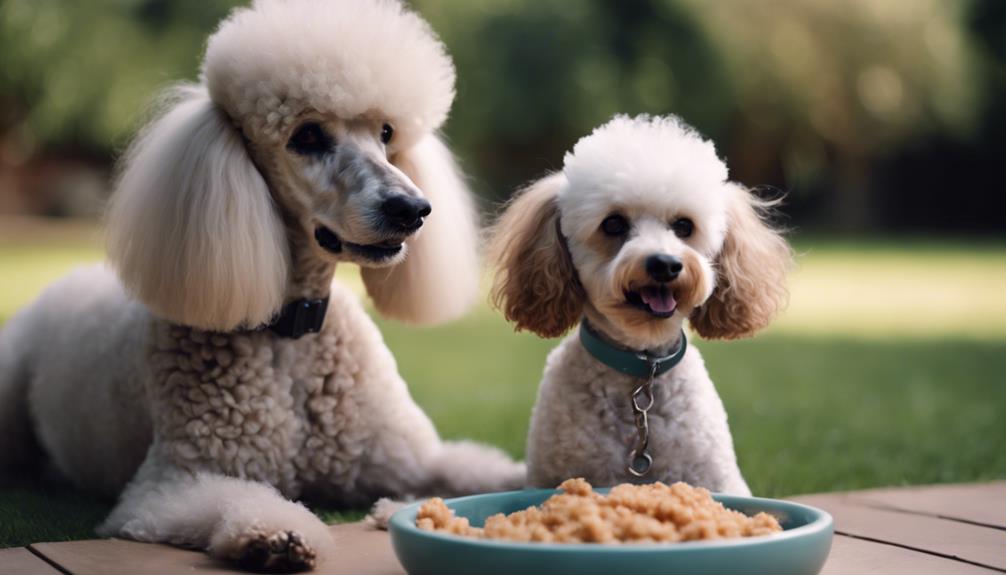
If your Poodle displays food aggression, employing techniques like hand-feeding and desensitization can effectively manage this behavior. Hand-feeding allows you to establish a positive association between you and your Poodle during mealtime, helping to reduce the guarding instincts triggering food aggression. Desensitization involves gradually exposing your Poodle to triggers that cause food aggression in a controlled setting, helping them learn to remain calm in those situations. Counterconditioning aims to replace your Poodle's negative response to food-related stimuli with a positive one through reward-based training methods. These techniques require patience and consistency but can be highly effective in addressing food aggression in your Poodle. Remember to always monitor your Poodle's body language and behavior cues during feeding to ensure a safe and controlled environment.
Addressing Resource Guarding Behavior
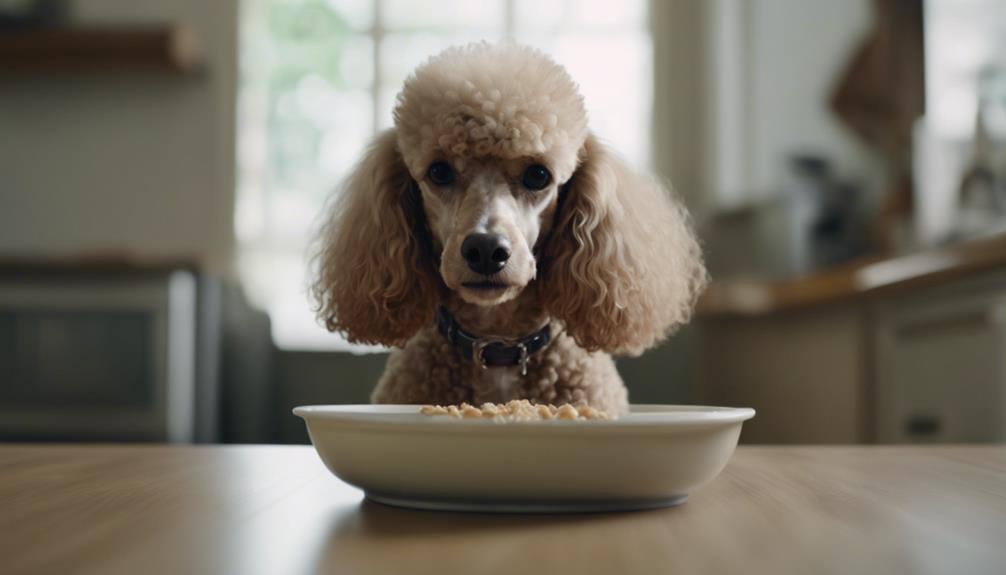
Recognize early warning signs like stiffening or growling, which indicate resource guarding behavior in your Poodle. Implement positive reinforcement techniques to encourage sharing and reduce possessiveness. If needed, seek guidance from a professional trainer to address and manage resource guarding effectively.
Recognizing Early Warning Signs
When observing your Poodle during meal times, pay close attention to any signs of stiffness, growling, or displaying teeth as these behaviors may indicate early resource guarding tendencies. To recognize early warning signs of food aggression in your Poodle, look for:
- Freezing: If your Poodle suddenly stops eating and stays completely still, it could be a sign of discomfort.
- Staring: Continuous staring at the food bowl or at you while eating may signal potential resource guarding behavior.
- Low growling: Even subtle growling while eating should be taken seriously as an early warning sign of food aggression.
Understanding these cues and your Poodle's body language can help prevent food aggression issues and create a positive mealtime environment for your furry friend.
Implementing Positive Reinforcement
To address resource guarding behavior in your Poodle, consistently reinforce positive actions during feeding time to promote a harmonious mealtime experience. Positive reinforcement is a powerful tool in modifying food aggression tendencies. By rewarding non-aggressive behaviors with treats or praise, you can help your Poodle understand that calm behavior around food is desirable. This approach creates a positive association between good behavior and mealtime interactions, reducing the likelihood of resource guarding. Consistency is key in implementing positive reinforcement techniques. Over time, your Poodle will learn to feel more relaxed and secure during feeding, leading to a more positive feeding environment for both you and your food-aggressive companion.
Seeking Professional Guidance
If you're finding that positive reinforcement alone isn't fully resolving your Poodle's food aggression, seeking professional guidance is crucial for effectively addressing this behavior. Professional trainers or behaviorists can offer tailored strategies to manage food aggression, preventing its escalation. Here are three reasons why professional guidance is essential:
- Certified professionals can accurately assess the severity of your Poodle's food aggression.
- They can create a customized training plan that suits your Poodle's specific needs.
- Seeking help early on ensures a structured approach to modifying resource guarding behavior, leading to long-term success.
Don't hesitate to reach out to experts for their guidance and expertise in handling food aggression in your beloved Poodle.
Step-by-Step Intervention for Food Aggression
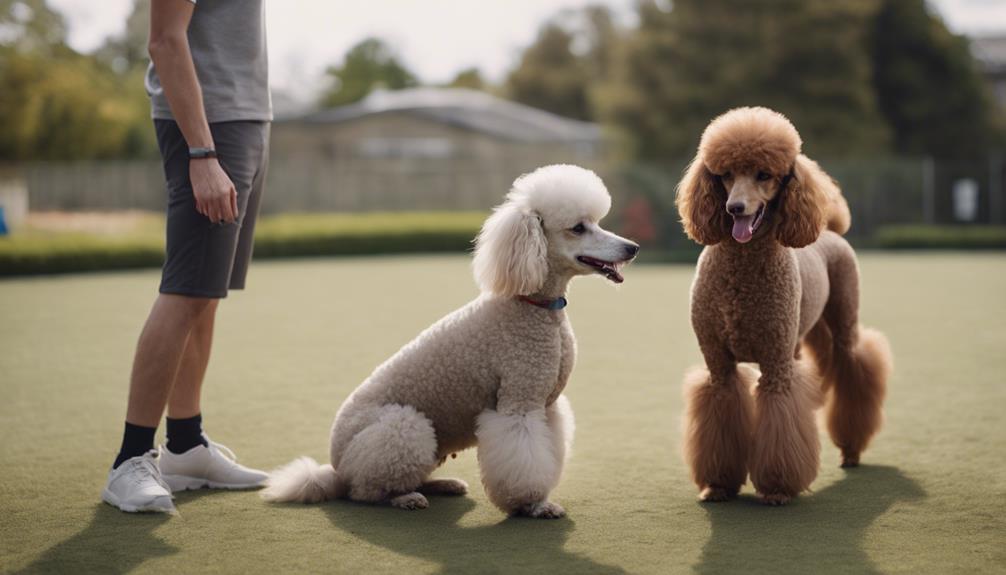
When dealing with food aggression in your Poodle, it's crucial to assess their behavior, implement structured feeding routines, and consider seeking professional guidance. Understanding the triggers behind their guarding instincts can help tailor interventions to suit your Poodle's needs effectively. By creating a safe and consistent feeding environment, you can gradually modify their behavior and promote positive interactions around food.
Assessing Food Guarding Behavior
When observing food guarding behavior in Poodles, pay close attention to their body language and reactions during mealtime. Look for signs like stiffening, growling, snapping, or aggressive postures while approaching the food bowl. To assess the severity of food aggression in your Poodle, consider factors such as their history, environment, and triggers. It's essential to evaluate these aspects to determine the most effective intervention strategies. Remember, seeking professional guidance is advisable if the food aggression in your Poodle seems severe or challenging to manage independently. Understanding your Poodle's behavior and reactions can help you address food guarding in a way that ensures their well-being and fosters a positive mealtime environment.
Implementing Structured Feeding
To address food aggression in your Poodle, implementing structured feeding through specific meal times and routines is key to promoting a calm and predictable environment. Structured feeding involves setting consistent meal times and creating a feeding intervention plan to help your Poodle associate feeding with peace and routine. By controlling when your Poodle eats, you can reduce anxiety and potential aggression during mealtimes. This approach not only benefits your Poodle but also prevents competition among multiple pets in your household, reducing the chances of food-related conflicts. Following a step-by-step structured feeding routine will help you effectively manage and address food aggression behaviors in your beloved Poodle. Remember, consistency and patience are vital in implementing this feeding strategy.
Seeking Professional Guidance
For effective management of food aggression in your Poodle, consider seeking professional guidance to develop a tailored intervention plan. Professional trainers or behaviorists specialize in addressing food aggression and can provide structured strategies for behavior modification. Here are three essential reasons why seeking professional help is crucial:
- Certified professionals offer specialized intervention plans tailored to your Poodle's specific needs.
- Expert guidance helps in identifying triggers, implementing effective behavior modification techniques, and monitoring progress.
- Seeking professional assistance early on can lead to successful management and resolution of food aggression issues in Poodles.
Common Mistakes in Handling Food Aggression
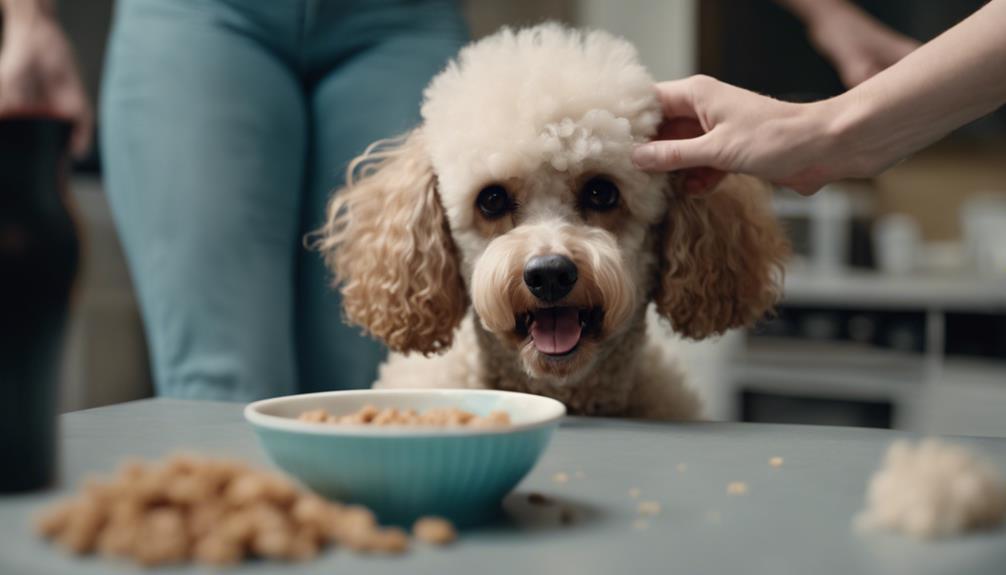
Misunderstanding the reasons underlying food aggression in Poodles can lead to ineffective handling techniques. When dealing with food aggression in Poodles, using punishment or intimidation methods can make the behavior worse. It's crucial to recognize subtle signs of food aggression early on to address the issue promptly. Inconsistency in handling food aggression can confuse Poodles and hinder progress. Avoiding professional help for severe cases of food aggression in Poodles may prolong the problem. Instead, focus on positive reinforcement, consistency, and creating a safe feeding environment. Remember, Poodles may exhibit food aggression due to past experiences, fear, or guarding instincts. By understanding these reasons and approaching the issue with patience and kindness, you can help your Poodle overcome food aggression. Don't hesitate to seek guidance from a professional trainer or behaviorist if needed. Your Poodle's well-being and safety are paramount, and addressing food aggression effectively requires patience, understanding, and the right approach.
Creating a Positive Feeding Environment
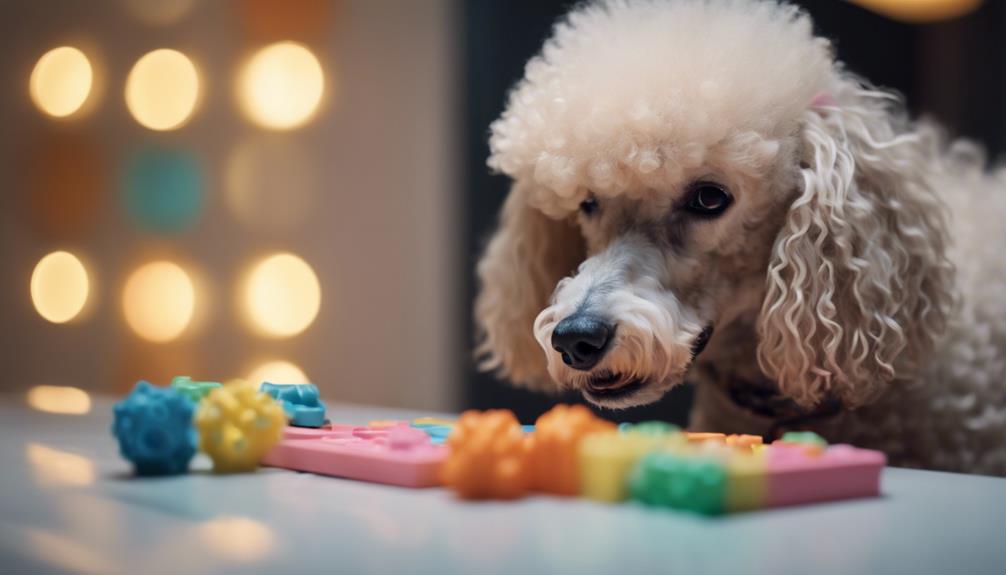
When creating a positive feeding environment for your Poodles, consider using separate feeding areas to prevent competition during meal times. Providing a quiet and calm feeding space can help reduce stress and anxiety during meals. This approach can make mealtimes more enjoyable for your Poodles and create a peaceful atmosphere for them to eat without feeling threatened. Additionally, establishing consistent feeding routines can help your Poodles feel secure and comfortable during meals, knowing when to expect their food.
Consider the following to create a positive feeding environment for your Poodles:
- Use separate feeding areas to prevent competition during meal times.
- Provide a quiet and calm feeding space to reduce stress and anxiety during meals.
- Establish consistent feeding routines to help Poodles feel secure and comfortable during meals.
Frequently Asked Questions
How Do You Discipline a Dog With Food Aggression?
When handling food aggression in dogs, focus on behavior modification through positive reinforcement. Seek professional training for tailored strategies. Avoid physical punishment and stay consistent, patient, and calm. Encourage good behavior around food with training exercises.
Can Dogs Be Trained Out of Food Aggression?
You can train dogs out of food aggression through positive reinforcement and desensitization techniques. Behavior modification and consistent training help change their response. Seeking professional guidance ensures progress. Stay patient and committed for success.
Can Food Aggression in Dogs Be Cured?
You know, sometimes a complete 'cure' for food aggression in dogs may not always be guaranteed. But with behavior modification, positive reinforcement, and professional guidance, significant progress and improvement can be achieved.
Are Poodles Food Aggressive?
Yes, Poodles can exhibit food aggression. Identifying triggers, implementing preventive measures, and applying behavioral modification techniques can help address this issue effectively. Seeking professional guidance is crucial for a safe and positive outcome.
Conclusion
So, remember, when dealing with food aggression in your Poodle, consistency is key. Just like a chef following a recipe, you must stick to your training techniques and routines. By establishing yourself as the pack leader and creating a positive feeding environment, you can help your Poodle overcome their food aggression. Keep practicing patience and understanding, and soon you'll see progress in managing this behavior effectively. Your Poodle's well-being is worth the effort!
